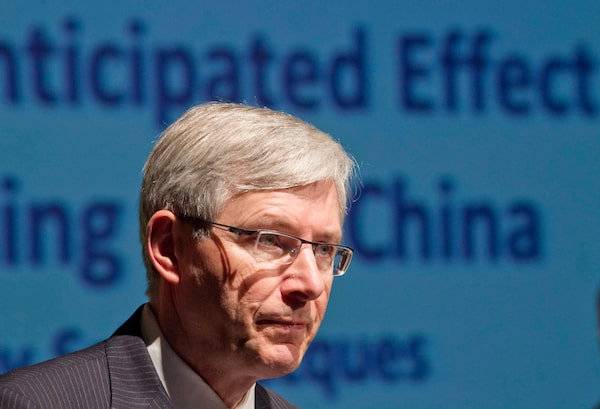
Guy Saint-Jacques, a former Canadian ambassador to China, seen here on Feb. 11, 2013, said he’s surprised Canada sent soldiers.JASON FRANSON/The Canadian Press
Beijing’s embassy in Canada says the fact the Canadian military just sent a “big delegation” to a sporting competition in China is more evidence the Asian power is not losing friends.
Canada-China relations are in a deep freeze after Beijing locked up two Canadians in apparent retaliation for Ottawa’s detention of a Chinese high-tech executive on an extradition request from the United States. China banned Canadian pork and beef and severely curbed purchases of Canadian canola seed and soybeans.
China has also come under heavy criticism for how the Beijing-backed administration in Hong Kong is handling unprecedented protests there, and in the mounting scrutiny of the internment of an estimated one million Uyghur Muslims in Xinjiang Province.
But the Chinese government, through its representatives in Canada, wants Canadians to know Beijing is not isolated or losing support.
It posted a statement on the website of its embassy in Canada to criticize a column published in The Globe and Mail last week, titled How China Loses Friends and Alienates People. The guest column by a U.S. academic discussed the backlash from China after Daryl Morey, general manager of the NBA’s Houston Rockets, tweeted remarks in support of the protests in Hong Kong and said bullying is self-defeating behaviour that will cost Beijing support.
The embassy said the list of China’s friends is growing. “More and more countries commend China’s foreign policy and development path. China’s friends are all over the world. This is a fact that can neither be obliterated nor changed by some people’s groundless accusations,” the Chinese embassy said.
“In the future, we will have more and more friends in various fields.”
It highlighted the presence of Canada and other nations in the World Military Games, held in China from Oct. 18 to 27.
International participation in the games, which attracted “9,308 military athletes from 109 countries, including a big delegation from Canada, speaks volumes in this regard,” the embassy said.
Ottawa didn’t issue any news release before or during the games to draw attention to Canada’s participation.
Daniel Le Bouthillier, head of media relations at the Department of National Defence, said Canada sent 114 athletes, 57 coaches and support staff.
Guy Saint-Jacques, a former Canadian ambassador to China, said he’s surprised Canada sent soldiers.
He said Canada must rethink how it engages with Beijing. “Now that we have seen the dark side of China, we have to have a much more realistic approach to China. Yes, we have to engage them ... but at the same time we have to take into account they can be very brutal if we do something they don’t like.”
Mr. Saint-Jacques said China’s pressure on other countries and companies to avoid criticism of its conduct is growing: “Their list of red lines is getting longer all the time. It used to be Falun Gong and Tibet and Taiwan. Now it’s Hong Kong and Xinjiang too.”
The Defence Department did not directly answer when asked why Canada sent athletes to China even as Foreign Affairs Minister Chrystia Freeland accuses Beijing of arbitrarily detaining former diplomat Michael Kovrig and entrepreneur Michael Spavor.
The department said Canada “remains deeply concerned by China’s actions, including the arbitrary detention,” added that it hoped the games foster friendship.
“The spirit of the World Military Games is to create a space for friendly competition among armed forces,” Mr. Le Bouthillier said.
China expert Charles Burton, who served in the Canadian embassy in Beijing, said National Defence should not have participated in the military sports games.
“At this time, there shouldn’t be any celebratory activities going on between Canada and China, and I would suggest a major sports competition is about celebrating friendship and therefore I think it was a mistake for our military to go,” he said.
Mr. Burton said Canada’s participation “must be quite offensive” to the families of Mr. Kovrig and Mr. Spavor. The two were arrested and later charged with stealing state secrets after Canada detained senior Huawei Technologies Co. Ltd. executive Meng Wanzhou last December. They have been in prison for almost a year.
Canada’s new ambassador to China, Dominic Barton, undertook consular visits with Mr. Spavor and Mr. Kovrig over the last week.
Mr. Burton, a senior fellow at Centre for Advancing Canada’s Interests Abroad, said he hopes the Canadian government will not send athletes to the Beijing Winter Olympic Games in February, 2022, because that would be signalling “that relations are normal and passively accepting what China is doing.”
Conservative MP Peter Kent said it was inappropriate to send athletes to Beijing.
“It is unacceptable. Basically, the government should be curtailing completely collegial events at a time when Canadians are held hostage and where trade embargoes have been improperly placed on contracted Canadian sectors,” he said.
Mr. Kent also said Canada should also consider boycotting the Olympics.
An earlier version of this article included an incorrect date for the Beijing Winter Olympics.
 Steven Chase
Steven Chase Robert Fife
Robert Fife